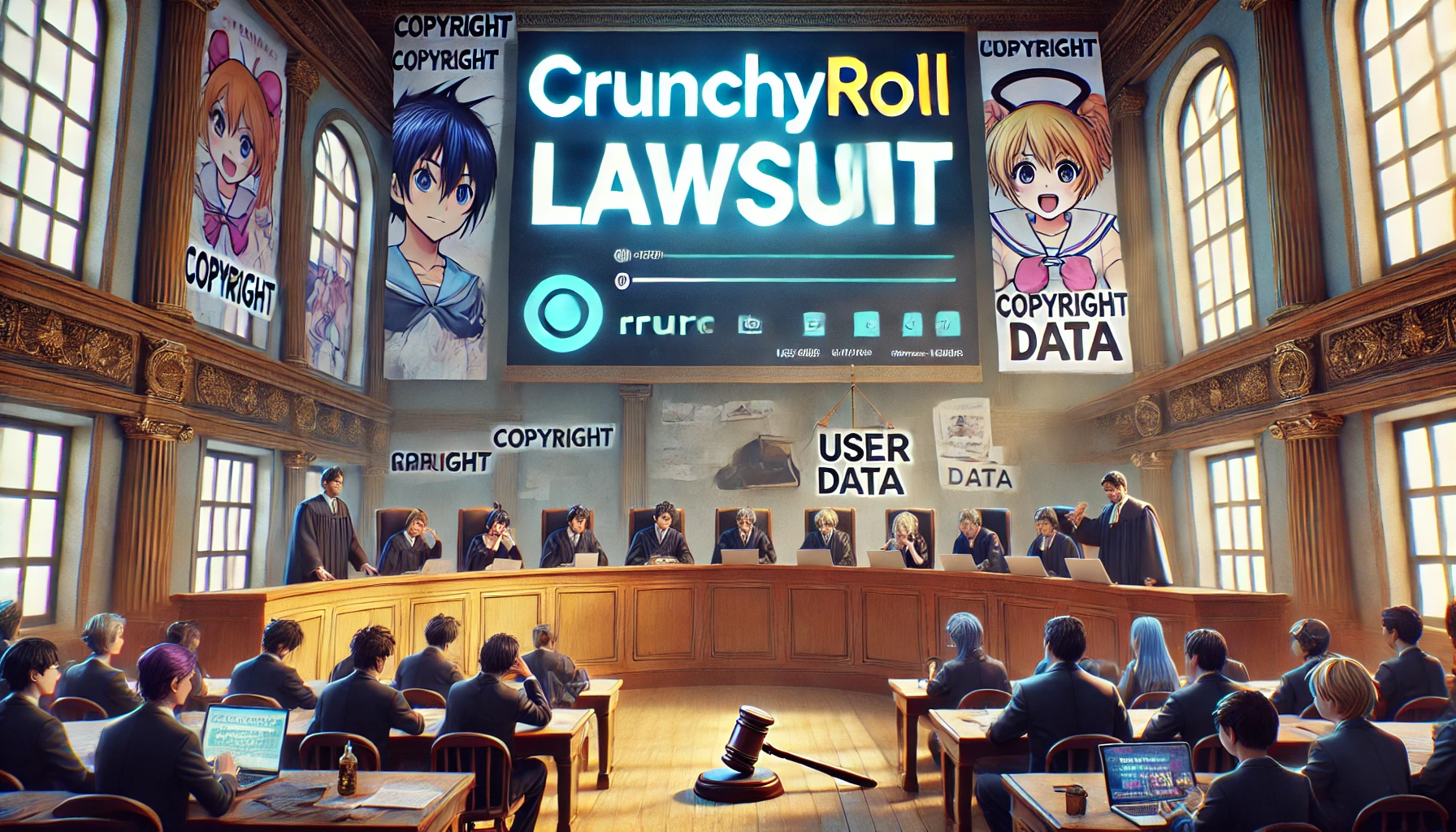Introduction
Anime has captured the hearts of millions worldwide, becoming more than just entertainment—it’s a cultural phenomenon. Streaming platforms like Crunchyroll have played a pivotal role in making anime accessible to fans across the globe. But with success often comes challenges, and one such challenge has recently taken center stage: the Crunchyroll lawsuit.
This lawsuit isn’t just a typical legal battle; it’s a matter of intellectual property, privacy, and fairness. What does it mean for the anime industry? How might it affect your favorite shows? These are the questions swirling in the minds of passionate fans like you.
In the sections that follow, we’ll break down everything you need to know about this legal case. Whether you’re a devoted anime lover or someone curious about the legalities of streaming, this article will shed light on the Crunchyroll lawsuit in a way that’s easy to understand and relatable.
Stay tuned to discover the full story, the stakes involved, and how it could shape the future of anime streaming. Let’s dive right in!
What is Crunchyroll?
Crunchyroll is a premier platform for streaming anime, manga, and Asian dramas, offering a vast library of licensed content to millions of users worldwide. Established in 2006 by a group of University of California, Berkeley graduates, it has grown into a cornerstone of the anime streaming industry.
The platform provides access to over 1,000 anime shows and more than 200 East Asian dramas in multiple languages, catering to a diverse and dedicated fan base. Its extensive catalog and commitment to timely releases have solidified its position as a leader in anime streaming.
In August 2021, Sony’s Funimation Global Group completed the acquisition of Crunchyroll from AT&T, bringing together two major players in the anime industry.
This merger aimed to enhance the distribution and accessibility of anime content globally.
Despite its success, Crunchyroll has faced legal challenges, including a class-action lawsuit concerning user information privacy. In September 2022, allegations arose that the company shared subscribers’ personal information with third parties without consent, leading to a $16 million settlement.
These legal issues highlight the complexities of operating a global streaming service and underscore the importance of adhering to privacy laws and licensing agreements. For users, it’s a reminder to stay informed about how their data is handled and to understand the legal frameworks that govern the platforms they use.
Overview of the Crunchyroll Lawsuit
The Crunchyroll lawsuit has become a focal point in discussions surrounding the anime streaming industry. At its core, the case addresses crucial legal issues that challenge the operational practices of such platforms. These include allegations of copyright infringement, licensing violations, and concerns over user data privacy.
Copyright Infringement Allegations
One of the central issues revolves around copyright. Crunchyroll has been accused of distributing content without proper authorization. While the platform claims to license content directly from producers and studios, critics argue that certain titles may have been streamed without meeting all licensing requirements. This raises questions about whether all anime creators and rights holders are adequately compensated.
Licensing Disputes
Licensing anime content is a complex process, especially when dealing with international properties. The lawsuit brings to light potential disputes with content providers over the terms of agreements. Some licensors allege that Crunchyroll has breached contracts or failed to fulfill obligations, such as geographical restrictions or payment terms.
User Data Privacy Concerns
The lawsuit also highlights alleged breaches of user data privacy. Claims suggest that Crunchyroll shared personal subscriber information with third parties without proper consent. This is a sensitive issue in today’s digital age, where data protection laws like GDPR and CCPA are strictly enforced. Such allegations not only risk legal penalties but also damage trust among loyal users.
Why This Lawsuit Matters
For fans and industry observers, this case is about more than legal technicalities—it’s a glimpse into the challenges faced by platforms balancing user satisfaction, licensing costs, and global operations. The outcome could set important precedents for other streaming services, especially in the anime sector.
As the case unfolds, Crunchyroll’s reputation and the broader industry’s approach to licensing and privacy may see significant changes. This is a story that resonates with anyone passionate about fair practices and the future of streaming.
Key Issues Highlighted in the Lawsuit
The Crunchyroll lawsuit has brought to light several critical issues that reflect the legal and ethical complexities of operating a global streaming platform. Let’s break these down to understand what’s at stake and why these matters resonate so strongly.
1. Copyright and Licensing Disputes
The foundation of any streaming platform lies in its licensing agreements. However, Crunchyroll has been accused of falling short in some areas:
- Ownership and Distribution Rights:
The lawsuit points to challenges over who truly holds the rights to distribute certain anime titles. With global audiences tuning in, such disputes have far-reaching implications for creators and producers who rely on fair compensation. - Streaming Unlicensed or Improperly Licensed Titles:
Allegations suggest that Crunchyroll may have offered some content without securing all necessary permissions. Whether these claims hold merit, they underscore the high stakes of ensuring every title is legally cleared before streaming.
2. User Data Privacy Concerns
In the digital age, user data is as valuable as gold, and platforms like Crunchyroll handle vast amounts of personal information. However, this lawsuit questions whether such data was handled responsibly.
- Unauthorized Use of Data:
Claims allege that Crunchyroll shared subscriber information with third parties without explicit consent. This includes details like viewing preferences and email addresses, which could be exploited for targeted advertising or other purposes. - Impact on Trust:
For a platform deeply reliant on its loyal user base, these allegations could erode trust. Fans may begin to question whether their privacy is being prioritized over profit.
3. Competitor-Driven Legal Challenges
Streaming anime is a fiercely competitive market, and this lawsuit hints at external influences that could be at play.
- Rival Platforms’ Involvement:
The rise of competitors like Funimation (now part of the same parent company as Crunchyroll) and Netflix Anime could intensify scrutiny on Crunchyroll’s practices. Some suggest that such lawsuits may be fueled by industry rivals aiming to capitalize on perceived weaknesses. - Implications for the Industry:
If these allegations lead to stricter regulations or costly penalties, other platforms might rethink their strategies. This could result in more cautious licensing processes or even a reduction in available content for fans.
Impact on Crunchyroll’s Operations
The Crunchyroll lawsuit has the potential to significantly influence the platform’s operations, reshaping its strategies and standing within the anime streaming industry. Let’s explore how this legal challenge could impact Crunchyroll in terms of reputation, business strategy, and financial health.
Reputation: Trust on the Line
Crunchyroll’s reputation has been built on its dedication to providing high-quality anime content to fans worldwide. However, legal disputes like this can tarnish even the strongest reputations.
- Public Perception:
Allegations of mishandling user data or licensing issues might make fans question the platform’s integrity. Loyal users could begin to wonder if their favorite anime platform is prioritizing profit over fairness and privacy. - User Trust:
Trust is essential for any subscription-based service. If fans feel their data isn’t safe or that creators aren’t being fairly compensated, they might start looking elsewhere for their anime fix.
Business Strategy: Adapting to New Challenges
This lawsuit could prompt Crunchyroll to reevaluate how it acquires and distributes content.
- Licensing Processes:
The company may need to adopt stricter measures to ensure every title is properly licensed, avoiding future disputes. This could mean fewer, but more securely licensed, titles on the platform. - Transparency and Compliance:
Crunchyroll might need to make its practices more transparent, offering clear explanations of how it handles content and user data. Doing so could reassure both licensors and subscribers.
Financial Implications: The Cost of Legal Battles
Legal challenges come with hefty price tags, and this case is no exception.
- Legal Fees and Fines:
Defending against these allegations could cost Crunchyroll millions, not to mention any potential settlement fees or fines if the case doesn’t go in their favor. - Impact on Growth:
Financial strain from legal costs might slow down expansion plans or limit investments in new content and technology. This could affect the platform’s ability to maintain its competitive edge in a growing market.
A Critical Moment for Crunchyroll
The outcome of this lawsuit will shape Crunchyroll’s future in ways that go beyond the courtroom. For fans, it might mean changes in the content they see or the trust they place in the platform. For Crunchyroll itself, this is a moment to reflect, adapt, and emerge stronger—or risk losing its standing as a leader in anime streaming.
What This Means for Anime Fans
The Crunchyroll lawsuit isn’t just a behind-the-scenes legal drama—it’s something that could directly affect your anime-watching experience. From the shows you love to the way you access them, this lawsuit may bring noticeable changes.
Changes in Content Availability
One of the first things you might notice is a shift in the number or variety of anime titles on Crunchyroll.
- Fewer Titles:
If Crunchyroll tightens its licensing processes to avoid disputes, some shows might disappear from the platform. This could mean fewer obscure or niche titles and a focus on mainstream, well-licensed anime. - Geographical Restrictions:
Licensing issues may lead to stricter enforcement of regional content availability. Some shows available in one country might become inaccessible in others.
Possible Adjustments to Subscription Terms
Crunchyroll might need to adjust how its subscription model operates to manage legal and financial pressures.
- Price Changes:
Legal costs and settlements could lead to increased subscription fees. While this isn’t guaranteed, it’s a possibility fans should be prepared for. - New Features or Tiers:
To rebuild trust, Crunchyroll may introduce new subscription perks, like exclusive content or improved user data protections, as a way to reassure subscribers.
Improved Transparency and Content Standards
On the positive side, this lawsuit could push Crunchyroll toward better practices.
- Clearer Licensing Practices:
Fans might benefit from greater transparency about how shows are licensed, giving creators more recognition and ensuring fair compensation. - Enhanced User Privacy:
Allegations of mishandled user data could prompt Crunchyroll to adopt stricter privacy policies, ensuring your data stays secure.
Why This Matters to You
As an anime enthusiast, you rely on platforms like Crunchyroll to bring you closer to the stories you love. While legal disputes can be disruptive, they also have the potential to improve how streaming services operate. This lawsuit might be the catalyst for Crunchyroll to evolve into a more ethical, user-focused platform.
While the short-term changes may seem inconvenient, they could lead to a better experience in the long run—one where you can enjoy anime with peace of mind and confidence in the platform you’re supporting.
Similar Lawsuits in the Streaming Industry
The Crunchyroll lawsuit may feel like a unique situation, but it’s far from the only legal battle in the streaming world. Platforms like Netflix, Hulu, and others have faced similar challenges over licensing, copyright, and user privacy. These cases offer valuable lessons about how the industry operates and how such issues can be resolved.
Netflix and Licensing Disputes
Netflix has encountered its fair share of legal troubles over content licensing.
- Unauthorized Distribution Claims:
Netflix was once accused of streaming content without acquiring the appropriate licenses in certain regions. These disputes highlight how critical it is for streaming platforms to navigate complex international licensing laws. - Outcome:
To address these issues, Netflix invested heavily in original content production, reducing its reliance on third-party licenses and gaining more control over its library.
Hulu and Copyright Infringement
Hulu has also faced legal challenges, particularly concerning copyright.
- Case Example:
Hulu was sued for allegedly allowing content to remain on its platform after licensing agreements had expired. This issue underscores the importance of clear contractual agreements with content providers. - Impact on Operations:
The lawsuit prompted Hulu to strengthen its compliance processes, ensuring content is removed or re-licensed before legal deadlines pass.
User Data Privacy Lawsuits
Several streaming platforms, including Crunchyroll, have been called out for mishandling user data.
- HBO Max Case:
HBO Max faced a lawsuit for allegedly sharing users’ viewing data with third parties, violating privacy laws. - Outcome:
The platform improved its privacy policies, ensuring users’ information was better protected and compliance with data regulations like GDPR and CCPA was enhanced.
Lessons Learned for the Streaming Industry
These lawsuits reveal recurring challenges that platforms face:
- Licensing Complexity:
Platforms must secure clear, airtight agreements to avoid disputes and protect relationships with content creators. - Data Privacy:
The handling of user information needs to be transparent and comply with privacy laws to maintain trust and avoid penalties. - Adaptation Through Innovation:
As seen with Netflix, developing original content can reduce reliance on risky licensing agreements.
Justice For The Wrongfully Deceased: Legal Representation Matters
Legal and Ethical Questions Raised
The Crunchyroll lawsuit shines a spotlight on critical legal and ethical challenges that aren’t just relevant to one platform—they affect the entire streaming industry. These issues touch on creators’ rights, user privacy, and the need for regulations to maintain fairness and trust. Let’s delve into these questions and their implications.
Are Anime Streaming Platforms Doing Enough to Respect Creators’ Rights?
Creators form the backbone of the anime industry, yet their rights often get overshadowed by corporate interests.
- Fair Compensation:
A major concern is whether streaming platforms adequately compensate creators and studios for their work. Legal disputes over licensing agreements suggest gaps in this area. - Cultural and Artistic Value:
Anime isn’t just entertainment—it’s art. Platforms have a responsibility to respect the integrity of the work they showcase, ensuring creators retain recognition and proper financial benefits. - A Need for Transparent Licensing:
Transparent processes would help ensure creators are aware of how their content is distributed and monetized, avoiding potential disputes.
How Should Platforms Balance User Privacy with Monetization Strategies?
Streaming platforms often rely on user data for targeted advertising and content recommendations, but this practice raises ethical concerns.
- The Privacy Dilemma:
Collecting user data without consent breaches trust. While monetization is essential for business sustainability, it shouldn’t come at the cost of violating user privacy. - Stricter Data Protection Practices:
Platforms need to adopt clear, user-friendly policies about how data is collected, stored, and used. Giving users control over their information can strengthen trust. - Ethics Over Profits:
Ethical business practices should prioritize user rights, ensuring that personal data isn’t exploited for short-term gains.
What Regulations Can Prevent Similar Disputes in the Future?
The lack of clear regulations in some areas has allowed these issues to persist.
- Standardized Licensing Protocols:
Governments and industry organizations could establish global standards for licensing agreements, making it easier for platforms to comply and avoid disputes. - Stronger Data Protection Laws:
Regulations like the GDPR (General Data Protection Regulation) and CCPA (California Consumer Privacy Act) serve as models for ensuring user data privacy. Expanding such frameworks could help safeguard users across more regions. - Mandatory Transparency Reports:
Requiring platforms to regularly publish transparency reports on licensing and data practices could improve accountability.
Potential Outcomes of the Lawsuit
The Crunchyroll lawsuit has opened the door to several possible outcomes, each of which could have a lasting impact on the anime streaming landscape. Whether the case is resolved through settlement, a court ruling, or changes in industry practices, the repercussions are likely to be felt far and wide.
1. Settlement or Dismissal
Many lawsuits in the streaming industry are resolved before they reach a final verdict.
- Out-of-Court Settlements:
It’s common for companies like Crunchyroll to negotiate a settlement to avoid prolonged legal battles. Settlements typically involve financial compensation to plaintiffs and agreements to adjust certain practices. - Dismissal of Claims:
If the allegations are deemed baseless or unsupported by evidence, the court may dismiss the case entirely. While this would clear Crunchyroll legally, lingering reputational damage could still affect the platform’s user base.
2. Industry-Wide Changes
If the lawsuit proceeds to a court ruling, it could set significant precedents for the streaming industry.
- Implications for Licensing:
A ruling in favor of the plaintiff may lead to stricter enforcement of licensing agreements. This could compel all platforms to revisit their content acquisition strategies and ensure full compliance with contractual terms. - Ripple Effects Across Platforms:
Other streaming services might adjust their operations to avoid facing similar legal challenges. This could result in slower releases, fewer titles, or higher subscription fees as companies strive to cover their legal bases.
3. Strengthened User Protections
One potential silver lining for fans could be improved user privacy and data practices.
- Focus on Transparency:
Allegations of mishandled user data could encourage Crunchyroll and similar platforms to adopt clearer and more transparent data policies. This would allow users to understand how their data is used and give them greater control. - Enhanced Privacy Measures:
Compliance with data protection laws like GDPR and CCPA might become a higher priority, ensuring that personal information is handled with greater care. These measures could rebuild trust and set a new standard for user-centric practices.
Lessons for Other Streaming Platforms
The Crunchyroll lawsuit offers valuable lessons for the broader streaming industry, acting as a reminder of the critical areas that require attention. As the digital entertainment landscape evolves, these lessons can help platforms avoid similar pitfalls and improve their operations.
Stronger Compliance with Licensing Agreements
Licensing is the foundation of any streaming platform, yet it is also one of the most complex aspects to manage.
- Ensuring Accurate Contracts:
Platforms must rigorously verify that all titles have the proper permissions for distribution. This includes understanding the nuances of regional and international licensing. - Avoiding Ambiguities:
Clear, detailed agreements with licensors can prevent disputes. Proper documentation of terms like usage rights, duration, and geographical restrictions is essential. - Collaborating with Creators:
Building strong relationships with content creators and production companies fosters mutual trust and minimizes the risk of misunderstandings.
Enhanced Transparency in Business Operations
Consumers are increasingly demanding accountability from the platforms they use.
- Open Licensing Practices:
Streaming services can benefit from sharing details about how they acquire content. While not every detail needs to be public, transparency about supporting creators and adhering to licensing laws can improve user trust. - Regular Transparency Reports:
Releasing reports on compliance efforts, data practices, and licensing audits can help platforms demonstrate their commitment to ethical business operations.
Proactive Measures to Protect User Data and Rights
Data privacy is a growing concern in the digital age, and mishandling personal information can lead to significant backlash.
- Adopting Robust Privacy Policies:
Platforms should prioritize creating and implementing clear privacy policies that align with regulations like GDPR and CCPA. - User Control:
Giving users control over their data—such as opt-ins for data sharing and easy account management—builds loyalty and reduces potential legal risks. - Investing in Security:
Regularly updating systems to prevent data breaches or unauthorized access is essential to safeguarding user information.
Conclusion
The Crunchyroll lawsuit offers a vivid glimpse into the intricate legal challenges that come with operating a global streaming platform. As anime continues to grow in popularity, platforms like Crunchyroll must navigate a maze of licensing agreements, data privacy regulations, and ethical responsibilities.
This case is more than just a legal battle—it’s a wake-up call for the entire streaming industry. It highlights the need to respect intellectual property, protect user privacy, and adhere to ethical practices. For fans, it’s a reminder that the shows they love are supported by an ecosystem that requires fairness and transparency to thrive.
As the lawsuit progresses, its impact may ripple beyond Crunchyroll, shaping the standards for how content is licensed, how data is handled, and how trust is built with users. The anime streaming world is at a crossroads, and this moment serves as a critical opportunity to redefine how platforms balance accessibility with accountability in the digital age.
In the end, whether you’re a fan, a creator, or simply someone invested in the future of streaming, this case underscores one truth: ethical and legal integrity isn’t optional—it’s essential.
Dive into the world of Legal Service with The Expert Law. Visit our website and unlock endless inspiration!





